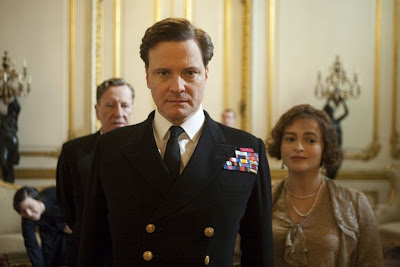Tuesday, January 11, 2011
Film Review: The King's Speech
Writer: David Seidler
Director: Tom Hooper
Producer: Iain Canning, Emile Sherman and Gareth Unwin
Cast: Colin Firth, Geoffrey Rush, Helena Bonham Carter, Guy Pearce, Jennifer Ehle, Eve Best, Freya Wilson, Ramona Marquez, Claire Bloom, Derek Jacobi, Michael Gambon, Timothy Spall and Anthony Andrews.
Historical drama / buddy-flick
1 hour 58 minutes
The recent excitement over the upcoming royal wedding between of Prince William and Kate Middleton shows that public fascination with royalty hasn't diminished over time. But unfortunately, they aren't always held in the same high regard as before; many people nowadays view the monarchy itself with indifference if not outright disdain. One of the many miracles of The King's Speech is that you needn't be feel one way or the other to appreciate it. It will likely convince you more of your opinions while feeling sympathetic for this everyman who became king.
As Malvolio said in Twelfth Night, "some are born great, some achieve greatness, and some have greatness thrust upon 'em." This is definitely a case of the latter. Colin Firth plays Prince Albert, who is dragged kicking and screaming to become King George VI after his brother Edward abdicates the throne. What makes this a terrifying prospect is his paralyzing stammer. The advent of radio only adds to the pressure, since broadcasts were initially all done live.
In a reverse-Pygmalion story, he develops an unusual relationship with an eccentric Australian speech therapist Lionel Logue (Geoffrey Rush). Logue is the commoner Professor Higgins who has to teach the aristocrat to speak normally. Amazingly, it's all quite true. The story is historically-based and very accurately rendered.
But it gets everything else right, too. The entire cast is exceptional, especially the lead roles played by Firth, Rush and Helena Bonham Carter (his wife Queen Elizabeth). The script is perfectly paced, smart, politically astute and surprisingly funny. The music supports the story beautifully, and occasionally borrows from classics (Beethoven and Mozart) with the sureness and appropriateness that the script borrows from Shakespeare.
Tom Hooper's artful direction is very assured and he carefully captures all of the subtleties of his actors, especially Firth's agonized verbal ticks. Unusually for a royal movie, he gives the film a grayish look that emphasizes both the King's state-of-mind and the country's pre-war, depression-era condition.
This film was a highly deserving winner of the Audience Award at the 2010 Toronto International Film Festival and immediately became a front-runner for the Oscars. Since then, it has suffered a bit of a backlash, from critics who look down their noses at crowd-pleasers and inspirational movies. Some wanted more of historical bits that weren't relevant to this story and frankly would have made the movie worse.
Some just didn't get it, including the usually insightful Manohla Dargis of the New York Times. She makes the mistake of remarking on what she'd rather see than reviewing what it is that she is seeing. She suggests the film is too uncritical of the monarchy, with its "benign view of the monarchy, framing Albert as a somewhat poor little rich boy condemned to live in a fishbowl, an idea that Mr. Hooper unwisely literalizes by overusing a fisheye lens."
But the wide-angle "fisheye" lenses weren't unwise at all. They do much more than just suggest a fishbowl. They create an offbeat tone for the film and underline the humour à la Brazil; they make the film much more personal, subjective and less detached by allowing closeups, while still providing a sense of the space; and they allow the filmmakers to shoot in much smaller quarters than usual for a royal-themed period piece (such as inside an elevator). Rather than unwise, Hooper proved to be ingenious in many of his directorial choices.
Though this was not my favourite film of the year, it was definitely in my top ten list. If the Oscar Best Picture nominees turn out the same as the Producers Guild nominees, then The King's Speech would be my pick. It is one of two or three films from that list that are just about perfect (whereas the over-praised The Social Network is a slight film at the service of a ton of dialogue).
Not only have the filmmakers made an interesting film about the seemingly uninteresting topic of a man's stuttering problem, but they have made a rousing, inspirational masterpiece that defies all expectations. It succeeds in every way imaginable and then some. Movies simply don't get much better than this.
Subscribe to:
Post Comments (Atom)



No comments:
Post a Comment